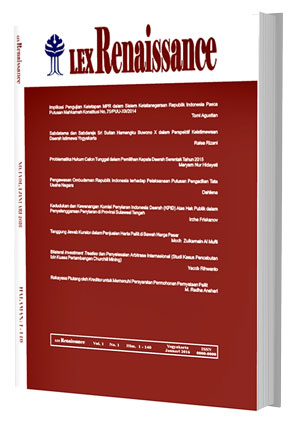Main Article Content
Abstract
In 2010, Purworejo District held the Regional Head Election (Pilkada) directly. The author conducted a study of the political coalition agreement in the Purworejo District Election in 2010 by formulating the problem of how to implement the political coalition agreement and how its juridical implications. The chosen research is qualitative research that produces descriptive data. The approach chosen in this legal research is nominative-empirical, that is, regarding the implementation of normative legal provisions in action on any particular legal action during the implementation of the Purworejo District Election in 2010. From the research, the author found the role of a Notary in making political coalition agreements in District Election Purworejo. In its implementation, there are two categories of parties to the agreement. First, the agreement between the prospective regent candidates and the regent candidates who are stated in an authentic deed and made before a Notary. Second, the agreement is underhanded between the candidates for the regent and the leaders of the political party who carry it. The political coalition agreement does not have direct juridical implications for the validity of the Purworejo district election process. The agreement also cannot be used as a strong evidence for filing a lawsuit / dispute to court even though the party has found a default.
Keywords: Political coalition; agreement; notary
Article Details
Authors who publish with this journal agree to the following terms:
a. Authors retain copyright and grant the journal right of first publication with the work simultaneously licensed under a Creative Commons Attribution License that allows others to share the work with an acknowledgement of the work's authorship and initial publication in this journal.
b. Authors are able to enter into separate, additional contractual arrangements for the non-exclusive distribution of the journal's published version of the work (e.g., post it to an institutional repository or publish it in a book), with an acknowledgement of its initial publication in this journal.
c. Authors are permitted and encouraged to post their work online (e.g., in institutional repositories or on their website) prior to and during the submission process, as it can lead to productive exchanges, as well as earlier and greater citation of published work (See The Effect of Open Access).



